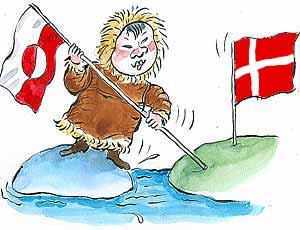February 27, 2008 (the date of publication in Russian)
Ruslan Kostyuk
CONFUSION IN THE DANISH KINGDOM
The precedent of Kosovo encourages Greenland and the Faroes
 Applauding Kosovo's commitment for self-determination and recognizing the breakaway province's sovereign status de facto and de jure, some member states of the European Union and NATO overlook their domestic secessionist risks. In addition to well-known Basque, Corsican, Scotch and Flemish secessionist movements, staunchly pursuing sovereignty of their regions, a similar sentiment is now emerging also in Denmark.
Applauding Kosovo's commitment for self-determination and recognizing the breakaway province's sovereign status de facto and de jure, some member states of the European Union and NATO overlook their domestic secessionist risks. In addition to well-known Basque, Corsican, Scotch and Flemish secessionist movements, staunchly pursuing sovereignty of their regions, a similar sentiment is now emerging also in Denmark.
Russian readers would be surprised to hear about secessionism in such a monoethnic state as Denmark (not to mention immigrants). Actually, separatist views are really emerging outside the peninsula of Jutland. State sovereignty is sought by the offshore provinces of Faroe Isles and Greenland. Curiously, the icy island is fifty times more spacious than the mother country.
Both Greenland and the Faroes enjoy an autonomous status within the Kingdom of Denmark. For many decades, the isles have got their own legislative bodies and governments. They are allowed to issue laws not contradicting to the kingdom's Constitution. In fact, Copenhagen has granted its offshore lands a lot of additional rights, some of them having even a foreign policy dimension. For instance, Greenland managed to acquire the status of an associate member of the European Union while the Faroes were admitted to a number of international institutions and associations. Sports fans are informed that the Faroes have got their sovereign soccer team. At the same time, the islanders are citizens of Denmark, and have a right for being elected to the Danish parliament.
The peaceful inhabitants of the islands, mostly engaged with fishing, were mostly satisfied with their level of life before the era of Maastricht. The Faroese secessionist mood, dating back to 1888, revived when the incomes of the local population started to decline due to liberalization of EU Common Fishing Policy. In addition, the measures of budget austerity, introduced by the incumbent rightist government of Denmark, suggested elevation of taxes along with slashing subsidies for local production that became utterly unprofitable. For similar reasons, the leftist coalition of Greenland's Social Democrats and Leftist Socialists raised the issue of independence. Meanwhile, the island bureaucracies are definitely attracted with the prospect of receiving grants from the European Union’s structural funds earmarked for transitional democracies. Not surprisingly, separatism is fueled with the issue of ethnic identity. The Faroese speak a dialect representing a mixture of Danish and Norse, while Greenland's Eskimos, with a language of their own, and don't consider themselves a part of the Danish nation.
Judging upon local polls, at least 40% of the islanders, for various reasons, are ready to vote for independence. Naturally, the official Copenhagen denounces the claims of the northern offshore provincials. Meanwhile, the laborious Faroese don't understand why they are regarded as a people less decent than the Kosovars. Unlike them, they never had an idea of ousting Danes from their homes, demolishing their churches or spawning criminal networks across the whole of Western Europe.
Number of shows: 1606
 ENG
ENG 

 ENG
ENG 
